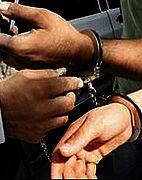Kayhan Publishes Charges Against Journalists
» Judiciary Silent; Minister of Culture Echoes Security Claims
Arrests and summons of journalists continue. But no official explanation for the arrests, where the journalists are being held or their conditions have been announced by judiciary officials. In contrast, pro-government newspapers have published their own charges against the journalists accusing them of having contacts with “foreign enemy media.”
Just a day after Soleiman Mohammadi, an editor at Bahar newspaper and Milad Fadai-Asl the political editor of ILNA labor news agency were arrested in an unprecedented measures, the offices of other newspapers such as Etemad, Bahar, Shargh, Arman and the weekly Aseman were raided by security agents who arrested Nasrin Takhiri, Sasan Aghai, Akbar Montajebi, Poorya Alemi, Pejman Mousavi, Amili Amrai, Motahere Shafii and Narges Javadaki, all editorial staff members of the publications. Their houses too were searched and personal belongings, including laptops computers, books, and handwritten notes were confiscated by the agents.
Saba Azarpeik, a writer for Baztab Emrouz site was arrested at her house. As reported by news reports, she refused to open the door of her house to the agents because they presented no arrest or search warrants, which resulted in them breaking the door of the house.
Keivan Mehregan, a journalist for reformist newspapers and Hossein Yaghchi, a writer for Aseman weekly and Tajrobe monthly were also arrested on Monday. But despite the claims of security affiliated media that some of the detainees had been released, till the time of this writing only Motahere Shafii, the political editor of Arman newspaper had been released.
Ali Asghar Shafiian, told reporters that his wife Ms Shafii’s suffered from MS indicating the understanding of the agents of her special conditions.
As of the time of this writing 13 journalists from Etemad, Shargh, Arman, Bahar and the weekly Aseman remain detained at Ward 209 of Evin prison in northern Tehran which is run by the ministry of intelligence. All are being kept in solitary cells.
Even family members of the detainees have not been contacted by security agents for an explanation for their arrest or their condition. The journalists themselves were given a few minutes to inform their family members of their health and were told not to mention their apparent charges or the conditions of their detention.
Reporters Without Borders has reported that the journalists were detained by the ministry of intelligence of the Islamic republic on the pretext of possible contacts with foreign based media. According to RWB, the charge of “cooperation with counter-revolutionary groups” against journalists is not new for the judiciary and security officials and that the Islamic republic has repeatedly used such accusations to silence journalists and intellectuals.
In addition to these arrests, Reyhane Tabatabai, Sadra Mohaghegh and Ehsan Mazandarani, journalists for Bahar, Shargh and Etemad newspapers have also been issued arrest warrants. In the meantime, other journalists in Tehran and other cities continue to be summoned to security offices or revolutionary courts.
RWB has reported that since January 11 a number of journalists have been summoned by the intelligence office of the Revolutionary Guards and the ministry of intelligence where they were interrogated. At the sessions the journalists were asked such questions as, “What plans do you have for the upcoming elections” and “Which candidates do you plan to support.” They were also asked what they thought about the speech given by ayatollah Khamenei in which he denounced the calls for free elections in the country.
Minister of Islamic Guidance Echoes the Words of the Security Apparatus
While the judiciary has remained silent on this new wave en-masse arrest of journalists, no official charges have been announced against them and no trials have been held, Mahmoud Ahmadinejad’s minister of Islamic guidance Mohammad Hosseini called the detained journalists “criminals” and asserted that their crimes were not press related.
Seyed Mohammad Hosseini further said that the journalists had contacts with people outside the country. According to a report by Fars news agency, which is closely affiliated to the security agencies of the Islamic republic, “It is possible that some of these individuals had fallen into this path unintentionally and without their own knowledge. In other words others had planned this for them. The journalists may have been thinking that they are merely doing their professional work and serving the public. Some individuals collected information from these journalists and sent them abroad. Some of these individuals were given direction from abroad on how to seed differences among government officials. They were knowingly or not playing the role of the fifth column of the enemy and strove to spread hopelessness and despair in the country.”
Kayhan newspaper went a step further and issued its own list of charges against the detained journalists and called them “media activists close to the proclaimed reformists and seditionists.” Sedition is the term Iranian rulers use for the leaders and supporters of the Green Movement who protested the official results of the 2009 presidential election. Kayhan claimed that one of the reasons for the arrests were the relations these journalists had with foreign enemy media such as the BBC. It claims they had contacts with exiled journalists working at the BBC and other counter-revolutionary news sites outside Iran.
Kayhan newspaper, which is run by a direct appointee of the supreme leader, also had other charges against the journalists which included, “cooperation with feminist organizations, creating differences among Iran’s ethnic groups, promoting despair and supporting the arrest of seditionists.”


